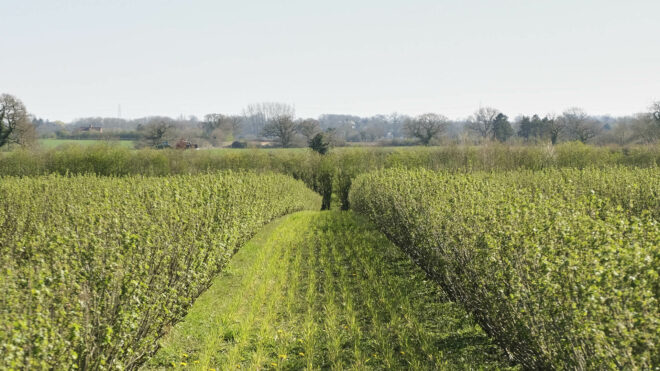Ribena is an iconic British brand, and its owner, Suntory, has launched a new project looking at how regenerative farming practices can reduce greenhouse gas emissions. The project, which also involves the University of East Anglia and the Soil Ecology Laboratory, is taking place across most of Rosie Begg’s 60ha of blackcurrant production at Gorgate Farm in Norfolk.
The aim is to reduce scope three emissions (indirect emissions that occur throughout a company’s value chain) from blackcurrant production and improve soil health, so that the soil can support plant resilience and sequester more carbon.
THE PROJECT
The project aims to minimise external inputs while improving soil health, plant nutrition and environmental protection through:
- Sap sampling to better understand and optimise blackcurrant plant nutrition. Macro and micro-nutrient imbalances affect plant resilience, making them more susceptible to pests and diseases
- Using novel and organic inputs to replace conventional inputs
- Creating diverse alleyway swards to feed the soil
- Improving soil health and carbon sequestration with compost extracts to restore soil microbiology.
Treasured memories
Second generation blackcurrant grower and research lead, Rosie says her family has grown blackcurrants for 24 years, although the farm has grown them since the 1950s. “My dad took on the Ribena contract in 1995. He very sadly died when I was 16. I have memories of being on the back of the harvester during school holidays – being a moody teenager at the time it didn’t feel very special but now I treasure those memories on the farm with him.”
Blackcurrant varieties grown on the farm include Gairn, Starav, Hope, Alder, Tirran and Klibreck. It also grows Victoria plums and arable crops.

Sustainable farming
Both Rosie and her husband Alex are dedicated to creating a sustainable, resilient farming business fit for the future, so Gorgate felt like a natural fit to host the pilot project. “We are passionate about the opportunities for nature-friendly food production, habitat restoration and engaging local people on the importance of this transition,” says Rosie.
Before the project started in April, sustainable practices were already a key feature at the farm. “We are trialling different plants along the blackcurrant alleyways – yarrow to help reduce snails and phacelia to encourage pollinators and reduce aphids. By increasing the insect population, we also hope to increase bird numbers,” she adds.
“We have a Higher-Level Countryside Stewardship Scheme across the farm and are part of the Upper Wensum Cluster farm group – a landscape-scale conservation project involving 22 farmers in the beautiful Upper Wensum river valley.”
Challenging climatic and economic conditions over recent growing seasons have led Rosie to investigate and adopt regenerative farming practices. “It’s thrilling to be able to bring in national experts and researchers to aid this ambition, and to be so supported by our customer,” she says. “Collaborating with Suntory’s global team will enable us to share our learnings and learn from regenerative projects all over the world.”
My vision is to make our farm a resilient business, with all decision-making being data-driven.
Rosie Begg
This project represents a shift away from more conventional practices. The principles are backed by credible science but have yet to be commercially tested in perennial fruit systems, says Harriet Prosser, Suntory’s agronomist. “We’re not just tackling greenhouse gas emissions, we’re looking to increase the amount of life in our soil, in turn improving soil health and fertility, which benefits the blackcurrant itself.”
Soil is the most important ecosystem, adds Rosie. “It’s linked to every function on the planet. By focusing on soil biology restoration, we can allow natural processes to support blackcurrant production with less intervention. My vision is to make our farm a resilient, diverse, exemplary business fit for the future, with all decision-making being data-driven.”
SOURCING BLACKCURRANTS FOR RIBENA
- Suntory Beverage and Food GB & Ireland sources blackcurrants for Ribena from 34 farms, with which it has a longstanding relationship. The farms are located around the UK. The factory is based in Coleford in the Forest of Dean, Gloucestershire
- Suntory’s growers harvest 10,000t of blackcurrants from 1,600ha each year
- Ribena is made from a unique blend of 10 different blackcurrant varieties, bred with the support of the James Hutton Institute, which has been developing new varieties for Ribena since 1956
- The blackcurrant harvest typically starts in the first week of July and continues until mid-August.


